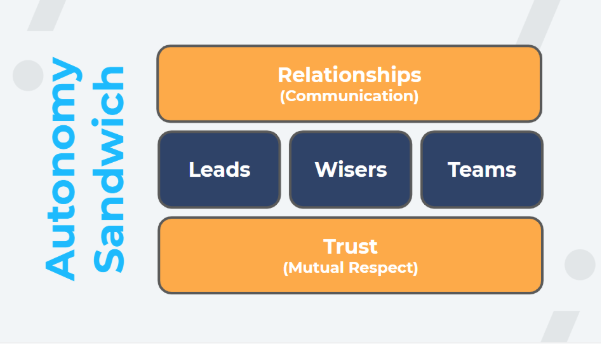Europeans have a €30 billion problem
From holidaymakers, students funding their student loans, people sending money to support loved ones back home, to small businesses working with overseas...

You’ve just started here. Shoot, maybe you’ve even been here awhile but you’ve just moved internally into a new role.
By the end of the first few weeks, your head is absolutely spinning. There’s a lot of information — and, right now, very little of it makes sense. The frustrating part is that, when you look around, everyone else seems to “get” it but you. And you’re not sure if you’re going to make it.
Welcome to the club. The good news is you’re not alone.
In Wise, I’ve chatted with nearly 200 Wisers over the past 6 months since I joined the People team.
I feel pretty fortunate to hear so many stories. Not to mention, it means I’ve learned a ton — from you, mostly.
Because I talk to so many folks, it often means our conversations have a lot of space in between them — like, months at a time. It also means that, when we chat, I’m only hearing about one snapshot of your journey. You evolve and change, just like I do.
Unusually, though, I ended up sitting down to chat with one Wiser named Chen a whopping 4 times during his first year at Wise.
At some point, I realized he held drastically different views on a bunch of stuff each time we talked. And they nearly perfectly represented what I’ve come to see as the 3 stages of a Wiser’s journey.
They’re pretty important. And pretty nifty. And I’m fairly sure you’ll find yourself identifying with at least one of them.
To be honest, I kinda skipped this as an actual stage because most of us pass through it so quickly. It’s the time when we’re super stoked to come work for Wise. Everything is new and shiny, and we can’t wait to jump in and get started.
We dream about our new role. We’re pumped and super positive about our team. And we feel like we’ve won the lottery.
It’s a really great feeling.
Sadly, though, it generally doesn’t last for long.

This stage often begins during or right after the company onboarding. Your mind feels like it cannot digest another piece of information. You get the feeling that, to really grasp what’s going on, you’ll need to spend all your free time outside of work studying.
Not only are you on information overload, but the way Wise is structured as a company is absolutely mind-boggling to you. It can feel like up is down and down is up. Are you going crazy? Why is everyone acting like this chaos is normal? Is everyone pretending or do they just know something you don’t? Are they serious about this or is there something they’re not saying?
“It’s really hard to find what I need.”
“Autonomous teams don’t work.”
“Wise needs more structure.”
“Our products fit together... how?”
“I feel so stupid. Everyone else gets it.”
“How do people get stuff done here?”
“I’m not sure I’m going to survive.”
Basically, we feel:
And, honestly, that really sucks.
But the good news is that we all go through this stage. Every last one of us. That means, ultimately, you’re not alone.
No joke. If you’re in this stage, really almost the only thing you can do is wait.
I know that’s a maddening piece of advice because it can make you feel helpless. But, I promise, for most of us, you’ll get through this stage before you’ve been at the company 6 months. The best thing you can do is simply know you’re there. And know that, likely, it will pass.
If you can, give yourself some grace. The reality is that it will likely get better — without you even doing anything.
This was something I learned from engineering new joiners.
Onboarding onto our Wise teams generally means a new joiner is assigned a mentor. In that arrangement, there’s a teacher and a learner — and there’s also a power dynamic. I’ve learned that, for a newbie, this power imbalance causes a lot of unintended consequences.
How it normally works is like this — a newbie is given a task to work on by themselves. When they get stuck or have a question, their mentor assumes the newbie will just ask.
There’s a problem, though.
Newbies are on high alert. And they’re afraid. They’re afraid of failing. They’re afraid of looking stupid. They’re afraid you won’t like them. They’re afraid they’re not good enough. They’re afraid they’re too much of a drain on a team. They’re afraid they won’t pass probation. They’re afraid they aren’t as smart as you thought they were when you hired them. And they’re most definitely afraid they’re bothering the very mentor they’ve been assigned.
Why is that?
Because, often times, mentors are still trying to accomplish what appears to be “very important work.” Which means asking them a question is interrupting their workflow. So the new joiner is concerned that the mentor has a limited amount of patience, and they don’t to use it up. They think if they ask too many questions they will:
So, what else can teams do?
There’s something engineers do called “pairing.” In fact, it’s so important that Google wouldn’t be what it is today without it. Simply put, pairing is when 2 developers work on the same computer, on the same code, but with 2 different keyboards. It’s really cool.
When you “pair” rather than “mentor,” it means the two of you are on equal footing. You work together on the same thing, side by side, rather than as the “expert” and the “not expert.” The newbie learns much faster what works, what doesn’t, and how we do things. And the seasoned Wiser learns to trust their new joiner because they are actively working together on something. It builds relationships and mutual respect a lot faster. And it takes out some of those ugly power dynamics we can be oblivious to.
Pretty neat. Right?
If you’re a lead and you have a newbie, try doing team retros if you don’t already.
This is also something I learned from our newest engineers.
Those who were on teams that did regular retros gained confidence a lot faster. During retros, team members talked openly about their struggles, their blockers, what they didn’t accomplish, and how they’d do better next time. When new joiners were on these teams, they learned faster that it was okay to fail — they wouldn’t get fired or punished for learning. They also learned what was possible, what wasn’t, and had an easier time learning how to navigate our unique company culture.

Most of us arrive in this stage when we finally feel like we actually have something to contribute to our team. It’s a great feeling. But it doesn’t mean we think we know it all. In fact, quite the contrary.
“I can find some stuff, but a lot I can’t.”
“Autonomous teams are a pain.”
“Wise structure is weird.”
“I get the general gist of our product.”
“I can’t know everything. That’s (probably) okay.”
“Getting stuff done here is hard.”
“I think I’ll be okay. Wise is (mostly) great.”
In this second stage, we feel:
Most of us get here. And, interestingly, I think most of us actually stay here.
Wise structure is still a mystery, though. It’s still confusing and we aren’t sure how to get stuff done. We don’t know where to begin if we want to work cross-team, let alone cross-office. And meeting other Wisers outside of those in our bubble is pretty darn hard.
This is where we can get stuck — feeling like there’s no other way.
But there’s some good news here, too. Remember I said there are 3 stages? Let’s find out about that one.

When I was chatting with Chen recently, I realized he’d gotten to a place most of us never reach. And it was pretty fun to listen to him talk.
“If I need it, I’ll find it.”
“Autonomous teams are fascinating.”
“Wise structure is unique.”
“I know enough about our product.”
“I don’t need to know everything.”
“I know how to get stuff done here.”
“I enjoy working at Wise.”
In this final stage, we feel:
I know some of you are reading this and saying, “What are you smoking, lady? This is impossible.” You may be incredulous.
“Is there actually a way to make it to stage 3?”
Yes! There is.
If you’re stuck, I’m here to tell you that you can totally get to a point where you’re thriving at Wise. It may just take some hard(er) work to get there.
I’m suddenly talking about autonomy — one of our favorite internal buzzwords — because, honestly, navigating your way through the stages has a lot to do with how you navigate through our autonomous teams.
So it’s worth a side note. At least a short one.
I’ve come to think about autonomy a bit like a sandwich. Because that’s kinda how it works.

You have to start with a basis of trust — an atmosphere that begins with mutual respect. “Even though I don’t know you yet, I think you likely have something to offer me. I’m listening.” When we set our default to “I trust you,” then magic things happen. But we can only sustain it under the protection of relationships. And, to build relationships, we need to talk to one another. Probably a lot.
But if any of these elements are missing — mutual respect, regular communication, trust and relationships between leads, Wisers, and teams — then autonomy inside Wise simply doesn’t work. It crumbles. And, boy does it suck.
Yes, building relationships and trust and communicating takes a lot of time. It doesn’t happen overnight. But, boy, when autonomy works, it really is a sight to behold. Wisers trust their leads. Leads trust their Wisers. Teams trust each other. And together, we end up accomplishing incredible feats.
But if you notice there’s a few elements missing in your current position, don’t despair. Oftentimes, with enough facetime willingness to hear each other out, we can start building up those relationships and the trust we need to make this sandwich work. If you’re shaking your head in defeat because you’re a bit of a coward, like me, don’t give up hope. There are a few ridiculously useful and radically practical, life-altering books from the Harvard Negotiation Project that may completely change your world like they did mine: “Difficult Conversations” and “Thanks for the Feedback!” Give them a read, or read summaries online first and then buy a copy. You — and these (sticky) situations — won’t regret it. I promise.
Autonomy side note over.

Because there really are some hacks and tips that may get you from one place to another.
This is what massively helped Chen. He started spending time with others inside Wise that, as he put it, “Were really smart. And didn’t seem nearly as bothered about autonomy as I was.” That’s when it occurred to him that there, likely, was another way. That our system of autonomy didn’t have to be nearly so painful. And that maybe, just maybe, it could work.
So he started paying attention to what these people — the ones that were thriving — were doing differently. And then he started trying out some of those same things.
Chen put it a bit like this, “Autonomy, as a work principle, is really effective in making decisions at lower, regional levels. In simple terms, it scales really well by putting more teams onto more problems.”
Autonomy puts decision-making power into the hands of those who know the problems the best and can, hopefully, make the best decisions.
Which means, we can move faster if we try to make as many decisions as we reasonably can without asking our leads. Like this blog post. Or the original talk I put together for our team call. Maybe it seems little to you, but it’s actually pretty big. At any of my previous companies I would have had to wait for weeks on end for my boss to give her stamp of approval. Instead, in this case, my lead wasn’t involved until the last minute, when I just asked him to quickly sense check the content in case I was missing anything.
Recently, an engineer told me about a company he worked at that worked exactly oppositely. One day, his boss came out of a meeting and said, “You know that project you’re working on that I’m not working on? You don’t have to worry. I was just in a meeting and we made decisions on where the project is going to go. You’re welcome.” The engineer was dumbfounded. How in the heck could his boss make a good decision on a project he knew almost nothing about? The engineer, who knew the nuances far better, should have been the one at the meeting. Making the decisions.
Chen previously started and ran his own successful company. So, when he came to Wise, he came hoping to learn how to navigate a late-stage startup. Which meant he began to think of everything as an “experiment.” He was trying out his ideas to find out what gained traction at Wise, and what failed.
Negotiating with the lead to get something rolled out didn’t work? Try talking to the team members instead. Sending out an email didn’t get the response you wanted? Try going up to people in person. Submitting a report seemed to be ignored? Talk to people who should have read it and find out why they didn’t care.
He was treating Wise culture like his customer. And AB testing his solutions to find out what worked.
Hell — yes, that really is what she’s called, and no, it has nothing to do with an eternally burning pit of fire — has been around Wise for nearly 5 years now. In Wise terms, that’s ancient. And, bless her soul, she’s saved me more than once from falling flat on my face.
In one particular instance I was working really hard to prove myself to a team. Giving tough feedback. Backing my opinions up with data. Proving I was just as competent, or moreso, as they were.
Hell somehow noticed and, in the quirky way she does it, gave me some advice. “I can see you’re trying really hard to make them see you’re smart. I think they’ve got it. Now, you need to try really hard to be a person with thoughts and feelings that gives a shit about their thoughts and feelings. Forget competency — find jokes. Invite them to dinner. Get drunk. Bond over stuff that annoys you. Ask deep questions that get under the surface. But, ultimately, spend time together. Because, after you build a relationship it’s going to be way harder to say ‘No’ to Mallory the real human being they know than it would have been to say ‘No’ to Mallory the one dimensional competent person they know nothing about.”
Maybe the above still feels too fluffy for you and you want to do something right away that will help take away some of this pain. These won’t fix it, but they are some pretty cool ideas you might not have heard of.
What in the h-e-double-l is a DACI page? It’s a term for a particular template from Confluence (our internal knowledge base). Basically, it has a whole chart thing that will help you show the pros and cons. Tag people. Put in a schedule of when you’ll do what. How you came to that conclusion. All kinds of useful stuff.
Someone wise once told me it’s tough to give hard feedback to someone if you don’t have a relationship established, first. A lightbulb went off for me when I heard that. It’s true, if I’ve spent enough time with someone to know that they respect and appreciate me, when they give hard feedback, it often doesn’t hurt because I know they have my best intentions in mind.
So, what do you do when part of your team is in an entirely different country and timezone? How do you build a relationship then?
You make the time to do 1:1s. I’m not just talking about the lead. The North American Verification team, split between 3 countries, decided to make their weekly team meetings biweekly. And then on the other weeks, have a one on one with a person from their corresponding team in a different office.
There’s a whole bunch of us here at Wise navigating this strange, beautiful, quirky culture. We can get through this. But only if we work together.
Hugs ‘n’ stuff.
Mallory
People Team | Fairly Friendly Human
*Please see terms of use and product availability for your region or visit Wise fees and pricing for the most up to date pricing and fee information.
This publication is provided for general information purposes and does not constitute legal, tax or other professional advice from Wise Payments Limited or its subsidiaries and its affiliates, and it is not intended as a substitute for obtaining advice from a financial advisor or any other professional.
We make no representations, warranties or guarantees, whether expressed or implied, that the content in the publication is accurate, complete or up to date.

From holidaymakers, students funding their student loans, people sending money to support loved ones back home, to small businesses working with overseas...

Discover how Wise outperforms 5 major New Zealand banks, PayPal, and Western Union, offering savings of up to 6x on international transactions.

Discover how Wise compares to major banks and money transfer services, saving you up to 4x on international transactions.

Discover how Wise compares to 5 major Japanese banks and Revolut, offering savings of up to 6x on international transactions.

Detailed research by Wise reveals substantial savings compared to Singapore banks and services like Instarem, Revolut, and Youtrip by EZ link.

Our average price stayed at 0.67% in Q4 2023. Overall, this quarter we 😞Increased fees on sending USD to countries outside the USA when using the SWIFT...